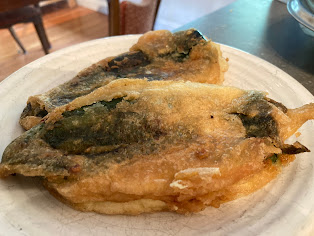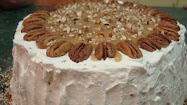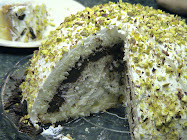Go thy great way!
The Stars thou meetst
Are even as Thyself—
Three baskets of sour cherries, balancing
precariously on top of a stack of boxes of I-don’t-know-what in Pars Food, a
few fruit flies buzzing around the sticky glisten of the bright red orbs. I
don’t think I had seen sour cherries for sale before, ever, anywhere. Now here
in this Persian grocery store in North York they stood, matter-of-factly
waiting to be purchased. My mother had died only weeks earlier and I missed her
terribly. Sour cherries reminded me of her, even though she had never in my memory, baked or cooked anything with them. I have no recollection of ever
seeing them in our house. But she had talked about sour cherries as if she knew
all about them, as if her hands had handled them countless times. Indeed, when
I asked them, my older sisters told me she had made sour cherry pie, canned sour
cherries and cooked sour cherry moos from the preserves. But eventually because they were so
perishable, grocery stores stopped selling them and my mother could no longer
preserve them. This all before my time. So when I saw those baskets of
cherries, I bought one, to hold onto a part of my mother I never had. I cried
for my mother that day.

 A few weeks later I flew to Bolivia on a research
assignment to spend three weeks on the Mennonite colony of Riva Palacios. Toward
the end of my stay there, I was introduced to Susanna Harms, an older
middle-aged woman whose husband had recently died. On the day that I dropped by
to interview her, two of her married daughters and some of their children were
spending the day, keeping their mother company and helping her feed the workers
she had hired to build a new house and landscape some of her hectares of land. It
was a busy household but Susanna found time to sit down with me to talk about
her life including her grief. “A day doesn’t go by,” she said with tears in her
eyes, “that I don’t cry for my husband.” After the formal interview I showed Susanna
and her daughters the pictures I had on my phone, including a picture of the
cherry pie I had made from those Pars Food cherries. I told them the story of
the cherries, why I had bought them, that I had baked a pie to remember my
mother by, that I had used a plate from her finest china to serve myself a
piece—I told them of my grief. When it was time for me to leave, we stepped
outside the house, a daughter and I, and continued the conversation of our
shared loss, hers a father, mine a mother. There were tears in both our eyes. I
returned to Susanna’s house the next day to interview her mother who was visiting
that day. Today a third daughter was spending the day. She said she would like
me to come home with her and have supper with her family. I gladly accepted the
invitation but it didn’t take me very long to figure out that what she really
wanted was to quiz me about the cherry pie. Evidently word got around. She untethered
the horse, got on the seat beside me and by the time she was guiding the horse onto
the village street, she was asking how I made the pie. She wanted details—ratio
of lard to flour—1 lb to 5 1/2 cups, no, halve the recipe, Kerry, so she won’t
be stuck with loads of pastry—the amount of sugar for the cherries—eijeijei, if
I don’t get this right they’ll all spit out the pie in disgust—bake in a hot
oven—what in blazes is 425ºF
in degrees Celsius—a pie pan—she’s not going to have one—and so it went. “I’m
going to make that pie,” she said.
A few weeks later I flew to Bolivia on a research
assignment to spend three weeks on the Mennonite colony of Riva Palacios. Toward
the end of my stay there, I was introduced to Susanna Harms, an older
middle-aged woman whose husband had recently died. On the day that I dropped by
to interview her, two of her married daughters and some of their children were
spending the day, keeping their mother company and helping her feed the workers
she had hired to build a new house and landscape some of her hectares of land. It
was a busy household but Susanna found time to sit down with me to talk about
her life including her grief. “A day doesn’t go by,” she said with tears in her
eyes, “that I don’t cry for my husband.” After the formal interview I showed Susanna
and her daughters the pictures I had on my phone, including a picture of the
cherry pie I had made from those Pars Food cherries. I told them the story of
the cherries, why I had bought them, that I had baked a pie to remember my
mother by, that I had used a plate from her finest china to serve myself a
piece—I told them of my grief. When it was time for me to leave, we stepped
outside the house, a daughter and I, and continued the conversation of our
shared loss, hers a father, mine a mother. There were tears in both our eyes. I
returned to Susanna’s house the next day to interview her mother who was visiting
that day. Today a third daughter was spending the day. She said she would like
me to come home with her and have supper with her family. I gladly accepted the
invitation but it didn’t take me very long to figure out that what she really
wanted was to quiz me about the cherry pie. Evidently word got around. She untethered
the horse, got on the seat beside me and by the time she was guiding the horse onto
the village street, she was asking how I made the pie. She wanted details—ratio
of lard to flour—1 lb to 5 1/2 cups, no, halve the recipe, Kerry, so she won’t
be stuck with loads of pastry—the amount of sugar for the cherries—eijeijei, if
I don’t get this right they’ll all spit out the pie in disgust—bake in a hot
oven—what in blazes is 425ºF
in degrees Celsius—a pie pan—she’s not going to have one—and so it went. “I’m
going to make that pie,” she said.
I was glad I had taken that picture, and missed my
mother all the more.
When we arrived Helen’s husband came out to unharness
the horse so that she could hurry in and prepare supper. She’d planned tacos
and ries met malkj. “Kjan jie ries met malkj,” she asked. Another lurch into
this co-mingling of grief and happiness. “Yes,” I answered, “my Mom would make it when
there was leftover rice.” We sat down at the table, Helen, Abram, their four
red-haired children and me. We bowed our heads and then reached for the fried
tortillas, the meat filling, the cut-up tomatoes and ladled the
rice-cooked-in-milk into our bowls. As I had done as a child, we added a
teaspoon of sugar and a sprinkle of cinnamon. The older children told me about
their school and the daily extracurricular reading their parents insisted on,
Helen described the pie to her family, Abram told me about going to Brazil together
with Helen’s parents for his late father-in-law’s medical treatment. When the meal
was finished and we had again prayed, the dishes were hurriedly washed and it
was time to go. It would take half an hour to make the trip back to the village
where I was staying, and it would be bed time for the children when they got
back. After dropping me off they would stop in at Helen’s mother’s to make sure
things were okay, and then drive home. I climbed into the buggy with a
pocketful of freshly roasted peanuts to eat on the way back, having been given them
as a gift by five-year-old Peter. I sat
on the back seat with the three oldest children. Helen and Abram and the
youngest wrapped in a blanket, sat in front.
We made that trip through the black black night mostly
in silence except for the whir of the wheels on the hardened dirt road surface
and the steady clip clop of the horse’s hooves. I had found comfort that
evening—honoured with warm hospitality, satiated with a bowl of reis met malkj—and
Heaven knows I needed comfort. The grief of my mother’s death was but a part of
what had been the most difficult year of my life. In that year I had lost not
only my mother whom I loved unreservedly, but I had lost another one whom I
loved and with whom I had planned to spend the rest of my life. Then an abrupt
end: “I don’t love you anymore, Kerry.” I reeled. I staggered. In the midst of this
desperate rawness, my mother got sick and died. In this year of loss-mounted-on-loss
my tears had never seemed to end. The rawness was slowly abating, but even so
it was never far beneath the surface. Riding in the buggy I felt the rawness
return, felt the familiar salty sting. But the comfort I had been given that
evening, it too hovered. As tears trickled down my cheeks in that still, black
blackness I looked up into the sky. I had never seen a night sky so white, so a-shimmer. The southern Milky Way dazzled in a breathtaking, beauteous
brilliance. And then I saw in that myriad of stars my tears. Each drop had
been plucked from the endless flow of the past year and fashioned into this
lustrous heavenly hurt that now surrounded me, shone down on me, gave me back
my tears as consolation. The next moment I saw again the brilliant beauteous
dazzle of stars, and in their glistening light, saw the three children
beside me, saw the rump of the horse, its tail bouncing back and forth in a
steady rhythm. A measure of succour, an easement of sorrow.
Thence we
came forth to rebehold the stars.
(The phrase “heavenly hurt” is from “There’s a certain Slant of Light” by Emily Dickinson. The opening poem excerpt is also
from an Emily Dickinson poem, “Go thy great way!” The blog post title and closing line
are from the final stanza of Dante’s Inferno.)















































